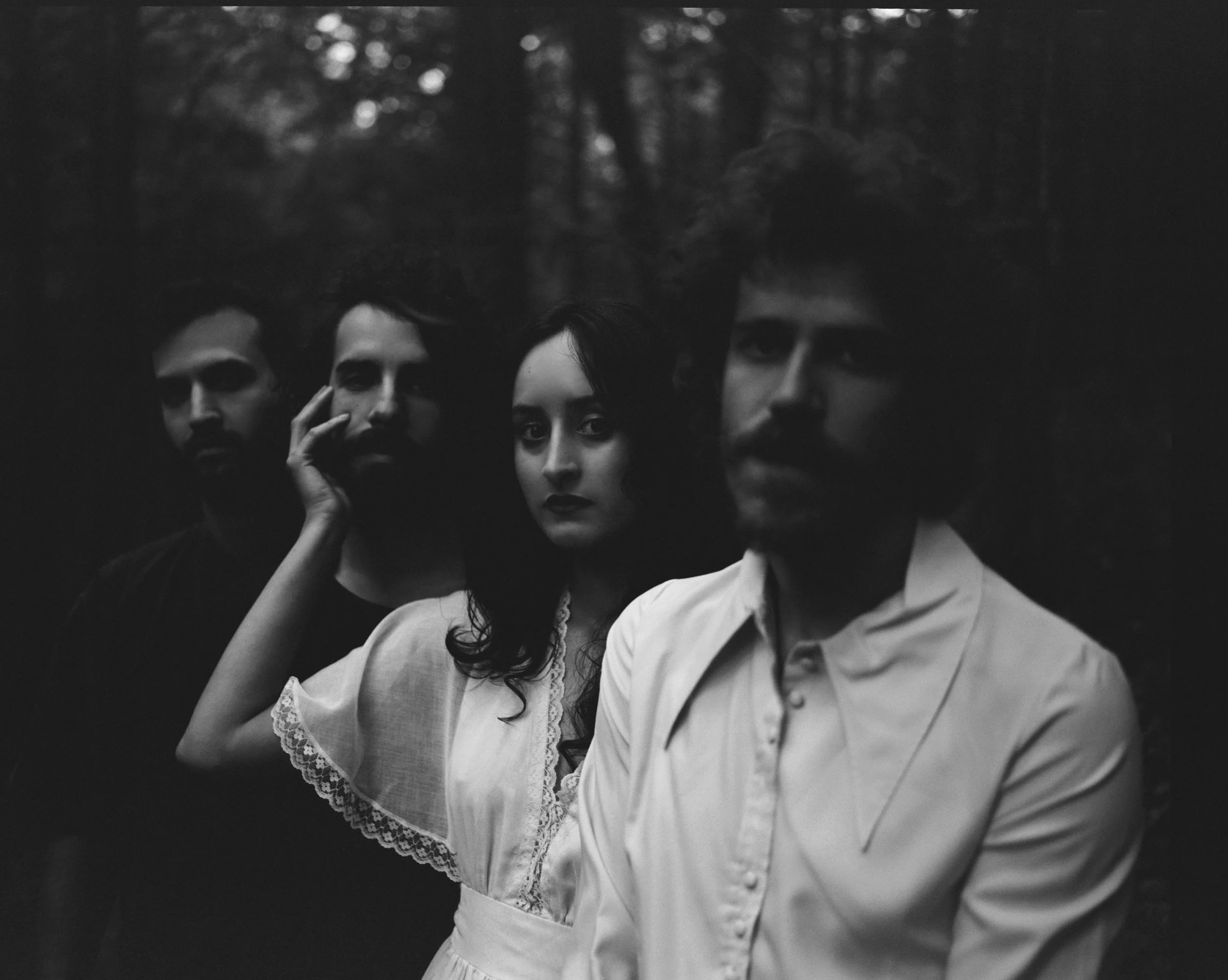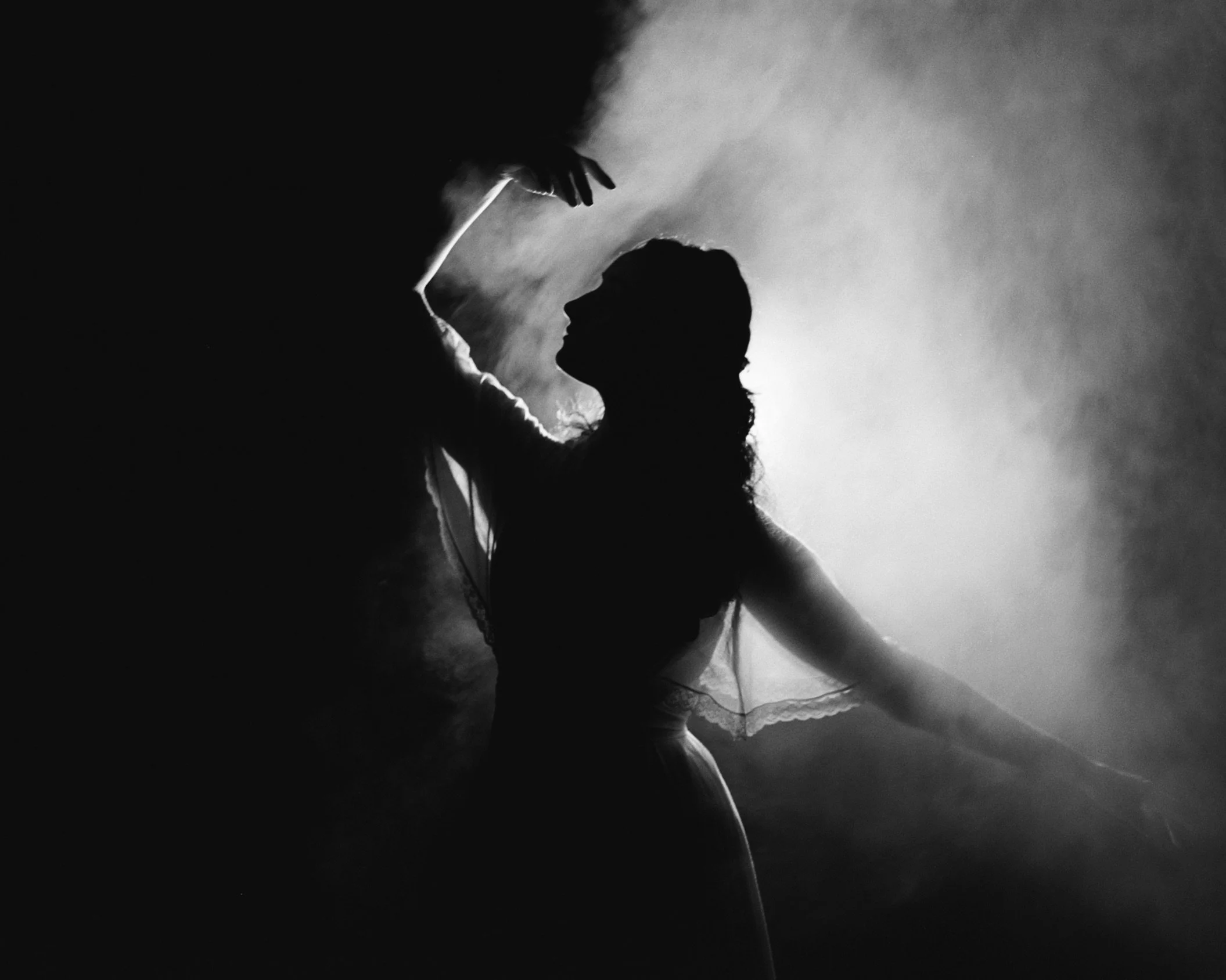Premiere: Camp Saint Helene “Baby Bird” Premiere + Q&A
feature/ interview by Beau Croxton
Camp Saint Helene by Angela Ricciardi & Silken Weinburg
Camp Saint Helene’s new single “Baby Bird” is a gorgeous sonic oasis to get lost in— and a perfect way to mark the beginning of the new season.
As autumn rolls in, leaves fall, and we move closer to a spooky-adjacent month, I couldn't think of a better house band to honor the season than Camp Saint Helene– Fall is the perfect time for a deep dive on the band, and a perfect time for them to drop some new music. The Catskills-based group has been described as “witchy psychedelic folk” and “occult-folk” by others (and I took that personally)...I’m gonna have to firmly agree with all parties.
Camp Saint Helene is named after a defunct Christian-summer camp turned arts-colony deep within the Catskill Mountains in Upstate New York. The band’s psychedelic folk-rock conjures up a sense of otherworldliness and wonder that feels nearly ritualistic at times– their tunes often build into moments of grandiose for singer Elizabeth Celeste Ibarra to soar with stunning vocal declarations.
Consisting of Elizabeth Celeste Ibarra, Dylan Nowik, Wesley Harper and Alex Wernquest, the band has been inducting folks into their sonic rituals since 2019. “Farfisa Song”, off their 2019 debut record was named KEXP’s Song of the Day and added to KEXP “Music that Matters” by Cheryl Waters. She describes the band as “..call[ing] to mind the ’60s California folk scene with their gentle, waltz-like pastoral sound”
In 2024, they were featured on an Angel Olsen-curated compilation record, Cosmic Waves Volume 1. via somethingscosmic / Jagjaguwar. This compilation included their single, “Wonder Now“ as well as their song, “Farfisa Song” , covered by Angel Olsen.
Today, (appropriately, on the very first official day of fall) Occult Magazine premieres their new single– “Baby Bird”. The track feels like one of the band’s most warm and optimistic studies and it finds the group veering into exotic sounds– flute, bells, and subtle sitar sounds accentuate the track colorfully.
The intro leads with soothing, descending flute harmonies. This main motif is strikingly familiar and almost nostalgic, yet it also hits like some brand new revelation that you didn't know you needed till now. Pastoral acoustic riffs and basslines intertwine and climb like vines in the forest– while subtle sitar sounds drive home the psychedelic, 1960s vibe.
In a stunning yet-subtle moment, Ibarra’s reverb-drenched vocals engage in a call and response with the harmonized flutes in a gorgeous and playful way– this moment is cleverly heightened by intricately crafted panning between the channels.
If you've heard the group before, you'll not be surprised that Ibarra’s vocals throughout are angelic and incredibly smooth, as she glides from major notes in the verses to more bluesy choruses that are met with Nowik’s harmonies and an ominous organ. In the final crescendo, flutes take off, and Ibarra’s vocals effortlessly match up with a majestic flute-frill– a moment which practically serves as a cherry on top.
It's a gorgeous and mystic track that (sonically) feels like it's chasing inner peace, and it's trying to share its findings with the listener. Like a lot of the band’s more pretty tunes– “Baby Bird” feels like the sonic equivalent to finding a spiritual oasis in the woods of the Hudson Valley– one that you never want to leave. Their brand of harmonious psych-folk on “Baby Bird” sounds incredibly nice– it's a very healing feeling to zen-out and let the music wash over you.
Below, you can listen to the exclusive premiere and catch our Q&A with Camp Saint Helene— where we chat about “Baby Bird”, 60s fringe psychedelic bands, their Angel Olsen collab, and more.
Q&A
BEAU: There’s a really rich instrumental palette on “Baby Bird”, it's beautiful— the bells, the flutes, and sitar sounds are amazing. What can you tell me about how that all came together ?
DYLAN NOWIK: I vacillate between the desire to make music that pushes sonic boundaries, versus material that just feels good to listen to, texturally, lyrically and musically. I think this one was more the latter; I wanted to keep it rooted in this woody, acoustic feeling; but I also wanted to keep the sonic palette interesting. I think the idea of the drums, bells and flute all kind of coming in at once was an idea I had from the start.
BEAU: Were there any specific influences that inspired “Baby Bird”?
DYLAN: I was thinking about those fringe psychedelic bands of the late 60s that evoke the feeling of nature, changing seasons, etc. Artists like Philamore Lincoln or The Fallen Angels. I think this song pays some homage to music like that.
BEAU: I would love to hear about collaborating with Angel Olsen for Cosmic Waves Vol I, that's such a perfect link up.
ELIZABETH CELESTE IBARRA: I think Angel was one of the first contemporary artists I heard who was making music that deeply resonated with me. I remember maybe a decade ago when Dylan looked at me in shock and said, “You don’t know Angel Olsen?!” Of course, then I became obsessed with Burn Your Fire and continued to follow her career, listening to all her records and going to her shows. Having her reach out about the Cosmic Waves record was soooo unreal and so so validating. Not to mention, the project itself was incredibly selfless and thoughtful - you don’t see too many artists these days going out of their way to uplift others in the way she did with this record.
BEAU: What have you been trying to achieve with your more recent material, versus your debut?
DYLAN: I don’t have a clearcut answer to that, but we’re asking ourselves these questions: How much do we value the idea of inventiveness or originality? How much do we value leaning into what feels good and true to ourselves, even if it may seem to be somewhat in conversation with something that’s come before us? Are we excited by complexity, or do we seek simplicity?
Above all, we’re trying to make sure that what we make feels compelling, even if only to ourselves.
WESLEY HARPER: This year has been about having fun making music and trying to relax a bit, while still keeping a deep intention. Our first two albums are complete bodies of work that we love and are very proud of. Baby Bird is us putting our energy into one song, instead of a whole album, which feels like a nice treat. It’s full and complete and stands on its own. The Call for Me EP we released in May was a winter project that came out of a “what if…” group-scheming scenario – we had one song, what if we brought it into this 3-part complete concept. And that sounded exciting, so we did it, and now it’s out. I think the difference in more recent material vs. our debut lies more in our personal internal states and approach to the music.
“Baby Bird” by Camp Saint Helene is out on streaming services tomorrow — September 23rd.
You can support Camp Saint Helene directly on bandcamp here.




